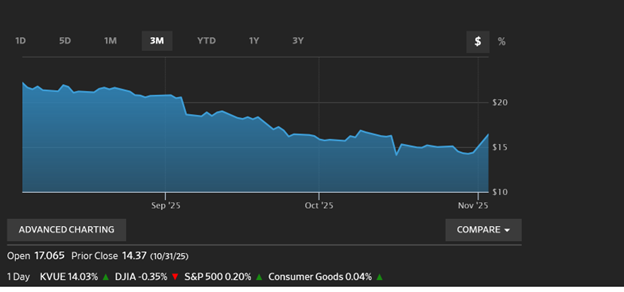How the World Really Works – Episode Two
OK, who has heard of Kenvue Inc? Not many of you, I suspect. Below is the corporate logo. Does that help?

Yea, I expect not, but you probably have heard of Tylenol, and Kenvue is the company that makes Tylenol, along with a lot of other over-the-counter health-related products like Visine, Neutrogena, Benadryl, Band-Aid and many others. It has been in the news in a less-than-positive way of late because some people – let’s not get into naming here – have claimed that Tylenol causes autism.
Whatever might be the evidence – or lack thereof – for that claim, it has not done good things for Kenvue’s stock price, a graph of which is displayed below, courtesy of WSJ:

Although it is hard to discern clearly in this image, the graph shows that Kenvue stock was trading at a share price of $22.18 on August 4, and at $14.24 on Oct 29. That’s a drop of around 36% over a three-month period. Ouch. Well, ouch if you happened to be holding shares of Kenvue during that time.
Again, though it is hard to see on the reproduction above, the WSJ original allows one to see that on Nov 3 – the day I am writing this article – the share price had popped back up a bit to $16.46.
On this same day there is an article in the WSJ headlined:
Kimberly-Clark Strikes $40 Billion Deal for Tylenol Maker Kenvue
Ah, a takeover bid from the giant company Kimberly-Clark, maker of Huggies and many many other brands you would recognize.
Here is one line from the WSJ article about this that caught my eye……
“In the cash-and-stock deal, Kimberly-Clark will pay $21.01 a share, compared with a closing price of $14.37 on Friday.”
So, K-C (no mention of The Sunshine Band) have agreed to pay $7 more per share than the shares could be bought for on the open market on the Friday before the deal was announced.
I ask you, if you saw a sweet-looking used Corvette on a lot on Friday with a price tag of $7500 on it, would you walk in on Monday and offer $12,500 for it?
Nah, me neither, but high finance is complicated, I guess.
Here’s another interesting line from the same WSJ article:
“The company had been under pressure from activist investors who wanted the company to pursue a sale.”
Activist investors? Do go on……
“Activist investor Starboard Value had launched a proxy fight at Kenvue earlier this year, arguing the company needed to fix its marketing strategy around its beauty brands and make other changes to boost shares. Starboard dropped its fight in March after winning three seats on the board.”
Ah, yes – ‘to boost shares’. The WSJ writer here is being prolix in deference to the delicate sensibilities of Starboard Value, so I will translate.
“Starboard Value argued that Kenvue’s management needs to do things that will increase the market price of the shares that Starboard Value owns.”
Simple, really.
One more quote from the WSJ article:
“Other activists including Toms Capital Investment Management, Third Point and D.E. Shaw had built up positions and were privately pushing Kenvue to sell itself, including in recent days, according to people familiar with the matter.”
Ah yes, those ‘people familiar with the matter’. They always seem to be around, but no one knows who they really are. At least you and I don’t.
Now, there is another article in today’s WSJ right below the one I have been quoting. It is marked EXCLUSIVE, and it’s headline reads:
Activist Investors in Kenvue Faced Big Losses. Kimberly-Clark Saved the Day.
Below that headline runs the sub-headline
D.E. Shaw, one of the Tylenol-maker’s largest shareholders, stood to lose over $200 million but is now expected to break even on its bet
I know I feel better knowing that K-C has ridden to the rescue of those poor embattled folks at D.E. Shaw. And – I think we have solved the mystery of the offer of $21/share for shares that were trading at $14. That wasn’t so hard, was it?
The final sentence in this second (EXCLUSIVE!) WSJ article is this:
“Kimberly-Clark and Kenvue say they expect almost $2 billion in cost savings from the deal in the first three years after the transaction closes.”
Once again, let me translate WSJ-speak for you: “The merged company is planning to fire a lot of people and close many plants over the next three years. “
“But ain’t that America, for you and me”